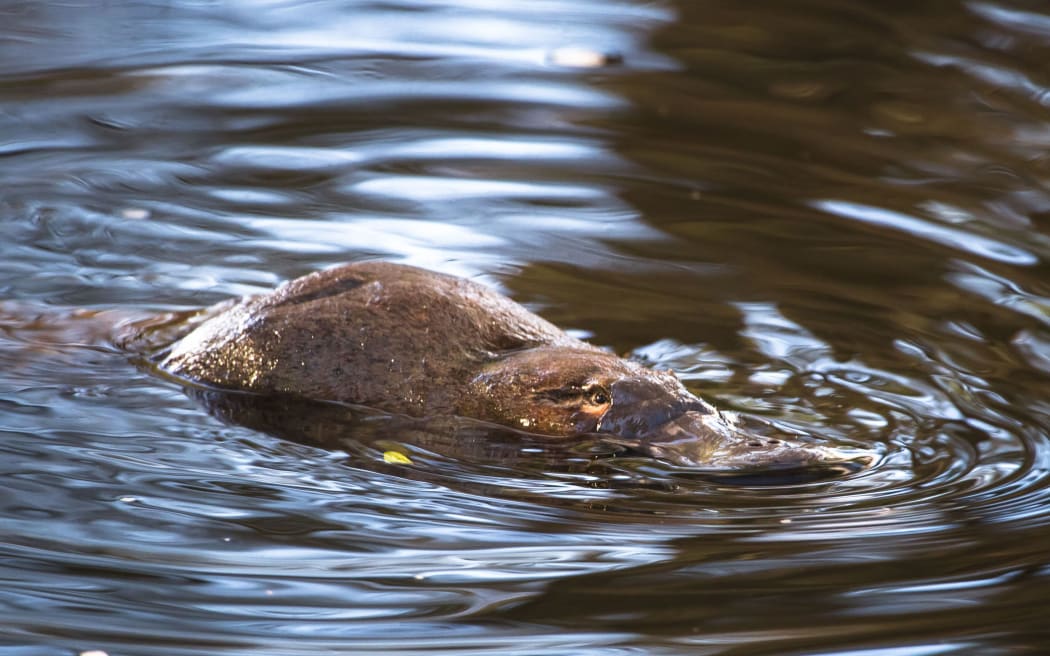A six-month-old baby platypus is the first-known animal of its kind to be born in Australia's oldest national park in more than 50 years.
The 850-gram female puggle, as baby platypuses are known, was discovered in the Hacking River in the Royal National Park south of Sydney.
It is believed to be the child of two of 10 platypuses - six females and four males - that were re-homed in the park last May.
The researchers behind the programme, from the University of New South Wales, the NSW National Parks and Wildlife Service and the World Wildlife Fund, conducted a weekend of night-time surveys to recapture the egg-laying mammals.
Project lead Gilad Bino said he was overjoyed to find the puggle after it swam into the team's nets.
"We were over the moon," Dr Bino said.
"It was just amazing … so rewarding and very humbling to be part of this mammoth effort."
He said the discovery of the puggle marked a significant milestone in the state's first-ever platypus translocation programme - and it was a "miracle" they were able to capture her.
"It's really looking for a needle in a haystack - it's a big system. There are only 10 animals," he said.
"We were using tracking data to try and see where we should be focusing our attention."
Dr Bino is awaiting the results of a biopsy to confirm the puggle's lineage, but is confident it is a descendent of the translocated platypuses.
"Before this project started, we confirmed that there weren't any platypuses here - we did a very thorough assessment of the water system," he said.
The team has asked Yuin, Walbunja, Dhoorga Gurandgi cultural man Uncle Dean Kelly to name the puggle, and has not excluded the possibility of more juveniles living in the Royal National Park.
Defying the odds
Last August, the project was put in jeopardy as thick, black sediment from the nearby Metropolitan Colliery contaminated Camp Gully Creek, upstream of the Hacking River, following a landslip.
It is the latest in a series of pollution events impacting the waterway believed to have been caused by the mine.
Researchers found no immediate harm to the platypuses, however water experts raised concerns that contamination impacting macroinvertebrates, which the platypuses feed off, could be deadly.
But Dr Bino said water discolouration and turbidity had improved.
"We've been monitoring water quality, monitoring food availability and everything seems to suggest that the conditions are favourable and can sustain platypuses here," he said.
"And as a testament, we are still seeing platypuses here a year later and successfully breeding."
Local environmentalist and biotechnician Cooper Riach, who inspected the waterways after five recent pollution events, said he was "relieved" a juvenile platypus had been found.
"This is just a testament to the amount of work that the team has put in to ensure the success of this project," he said.

A duck-billed platypus Photo: 123RF
Contamination 'not acceptable'
In the Land and Environment Court last week, Metropolitan Colliery pleaded guilty to two counts of polluting Camp Gully Creek and one count of contravening a licensing agreement dating back to 2022.
Riach, a member of the Sutherland Environment Centre, said he believed not enough protective action had been taken against Metropolitan Colliery.
"There have been five contaminations in the past two years," he said.
"Picking [the coal waste out of the water] feels like a horrible, congealed custard - it took me about a week to get the stuff out from under my nails.
"The fact that this, on numerous occasions, has been flowing through [one of] our oldest and … most beloved national parks is simply not acceptable."
Peabody, the owner of Metropolitan Colliery, said in a statement the company had "worked tirelessly in cooperation with the EPA [NSW Environment Protection Authority]" to implement a programme of improvements to surface water management.
"Protecting the environment and maintaining the support of the community are top priorities for our steel making coal operation and our 400-strong local workforce," the statement said.
Tougher laws possible
New South Wales Environment Minister Penny Sharpe attended the weekend's survey and said she believed the project could be replicated in other areas.
"If we head into drought conditions again, we actually have a system in NSW to save platypuses, to rehabilitate them, but also put them back into the wild," she said.
When asked about the repeated pollution events, Minister Sharpe said she was confident the EPA was properly managing Metropolitan Colliery.
"I've said to them previously that if they are doing the wrong thing, you throw the book at them," she said.
Minister Sharpe said this week that the government was looking to legislate the largest set of amendments to the EPA's powers since the regulator was established in 1991.
"Tougher investigation powers, stronger penalty notices, much higher fines [will be considered] for those doing the wrong thing," she said.
- This story was first published by the ABC.



